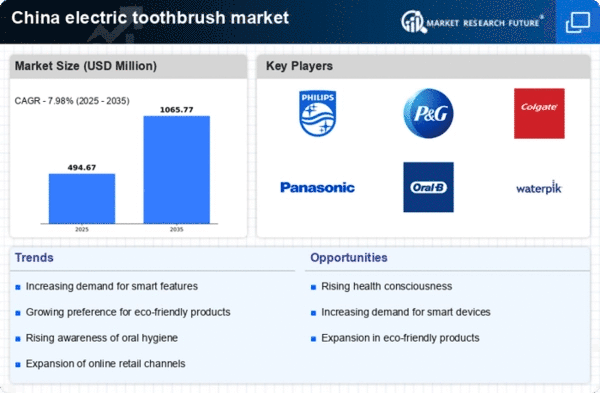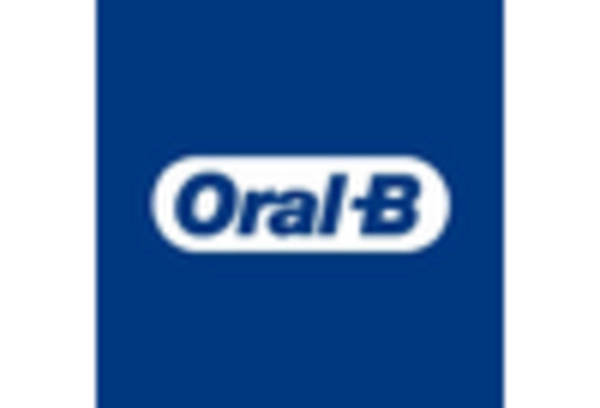Focus on Sustainability
The growing emphasis on sustainability is emerging as a significant driver for the electric toothbrush market. Consumers are increasingly seeking eco-friendly products, prompting manufacturers to innovate with sustainable materials and packaging. In 2025, it is projected that around 30% of electric toothbrushes sold in China will feature biodegradable components or recyclable packaging. This shift towards sustainability aligns with broader environmental concerns and consumer preferences for responsible consumption. As brands respond to this demand, the electric toothbrush market is likely to see a rise in sales of eco-conscious products, appealing to environmentally aware consumers.
Influence of E-commerce
The rapid growth of e-commerce platforms in China is transforming the electric toothbrush market landscape. With the convenience of online shopping, consumers can easily access a wide range of electric toothbrush options, often at competitive prices. In 2025, it is estimated that online sales will account for over 60% of total electric toothbrush sales in China. This shift not only broadens market reach but also allows brands to engage directly with consumers through targeted marketing strategies. As e-commerce continues to thrive, the electric toothbrush market is likely to benefit from increased visibility and accessibility, driving sales further.
Rising Health Awareness
The increasing awareness of oral health among the Chinese population is a pivotal driver for the electric toothbrush market. As consumers become more informed about the importance of dental hygiene, the demand for effective cleaning solutions rises. Reports indicate that nearly 70% of urban Chinese adults prioritize oral health, leading to a surge in electric toothbrush sales. This trend is further supported by educational campaigns promoting the benefits of electric toothbrushes over manual ones, which are perceived as less effective. Consequently, the electric toothbrush market is experiencing robust growth, as consumers seek products that enhance their oral care routines and contribute to overall health.
Technological Integration
The integration of advanced technology into electric toothbrushes is significantly influencing the market. Features such as Bluetooth connectivity, real-time feedback, and personalized brushing modes are becoming increasingly popular among consumers. In 2025, it is estimated that around 40% of electric toothbrushes sold in China will incorporate smart technology. This trend not only enhances user experience but also encourages better brushing habits through gamification and tracking. As technology continues to evolve, the electric toothbrush market is likely to expand, attracting tech-savvy consumers who value innovation in their oral care products.
Growing Middle-Class Population
The expansion of the middle-class population in China is a crucial driver for the market. As disposable incomes rise, consumers are more willing to invest in premium oral care products. Market data suggests that the middle-class segment is projected to grow by 50% by 2030, leading to increased spending on health and wellness products, including electric toothbrushes. This demographic shift is fostering a culture of quality and convenience, where consumers prioritize effective dental care solutions. Consequently, the electric toothbrush market is poised for growth as more individuals seek to enhance their oral hygiene practices.
















